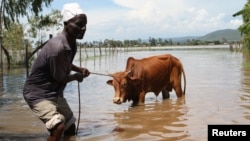NAIROBI —
Kenya is preparing for more devastating floods as the annual rainy season draws near. According to the United Nations' disaster management agency, hundreds of thousands of Kenyans are affected by the floods and other disasters ever year.
The deputy director of Kenya's National Disaster Operation Center, Jeremiah Njagi, says his agency is monitoring patterns of both excessive rain and drought in an effort to head off the disasters Kenya has experienced in years past.
“When the rain comes we expect floods, and we are preparing for that," he said. "And we are also monitoring the drought pattern because when drought falls in, it affects the crops and then famine follows, so we are trying to monitor the rain patterns and the drought patterns so that we can plan for food security.”
During the past few years, hundreds of thousands of people across Kenya have been praying for rain during a devastating drought that put the country on the brink of a major humanitarian crisis.
But now, with East Africa's long rainy season about to begin, many Kenyans are bracing for flooding and waterborne diseases.
Some critics have accused the Kenyan government of not responding quickly enough when disasters strike. Njagi notes that independent aid groups are sometimes better positioned to help people in need.
“NGOs [non-governmental organizations] are there and we know what they do, is just to assist and they are well supported. I would say some of them are better supported that sometimes they have the resources that maybe the government might not have at that time, at that place,” he said.
According to the United Nations Office for Disaster Risk Reduction (UNISDR), the lives of more than 200 million Africans are disrupted each year by floods, drought, crop failure and other large-scale disasters. It says the majority of them are women and girls.
Pedro Basabe, the office's chief in Africa, says there is a need to empower women to reduce and fight disasters at the community level.
“Women and girls, they are working at the community level, they take care of their livelihoods, they take care of their families, and in the case of disaster, they are those who suffer the most and most vulnerable," said Basabe. "But we also need to recognize these efforts and to capitalize for them also to have more education, more participation in order to take decisions because in that case, they will be able also to reduce the impact of disaster in their communities.”
The U.N. has declared Friday as World Disaster Reduction Day, to promote efforts to lessen the frequency and impact of catastrophes that affect so many millions of people.
The deputy director of Kenya's National Disaster Operation Center, Jeremiah Njagi, says his agency is monitoring patterns of both excessive rain and drought in an effort to head off the disasters Kenya has experienced in years past.
“When the rain comes we expect floods, and we are preparing for that," he said. "And we are also monitoring the drought pattern because when drought falls in, it affects the crops and then famine follows, so we are trying to monitor the rain patterns and the drought patterns so that we can plan for food security.”
During the past few years, hundreds of thousands of people across Kenya have been praying for rain during a devastating drought that put the country on the brink of a major humanitarian crisis.
But now, with East Africa's long rainy season about to begin, many Kenyans are bracing for flooding and waterborne diseases.
Some critics have accused the Kenyan government of not responding quickly enough when disasters strike. Njagi notes that independent aid groups are sometimes better positioned to help people in need.
“NGOs [non-governmental organizations] are there and we know what they do, is just to assist and they are well supported. I would say some of them are better supported that sometimes they have the resources that maybe the government might not have at that time, at that place,” he said.
According to the United Nations Office for Disaster Risk Reduction (UNISDR), the lives of more than 200 million Africans are disrupted each year by floods, drought, crop failure and other large-scale disasters. It says the majority of them are women and girls.
Pedro Basabe, the office's chief in Africa, says there is a need to empower women to reduce and fight disasters at the community level.
“Women and girls, they are working at the community level, they take care of their livelihoods, they take care of their families, and in the case of disaster, they are those who suffer the most and most vulnerable," said Basabe. "But we also need to recognize these efforts and to capitalize for them also to have more education, more participation in order to take decisions because in that case, they will be able also to reduce the impact of disaster in their communities.”
The U.N. has declared Friday as World Disaster Reduction Day, to promote efforts to lessen the frequency and impact of catastrophes that affect so many millions of people.








